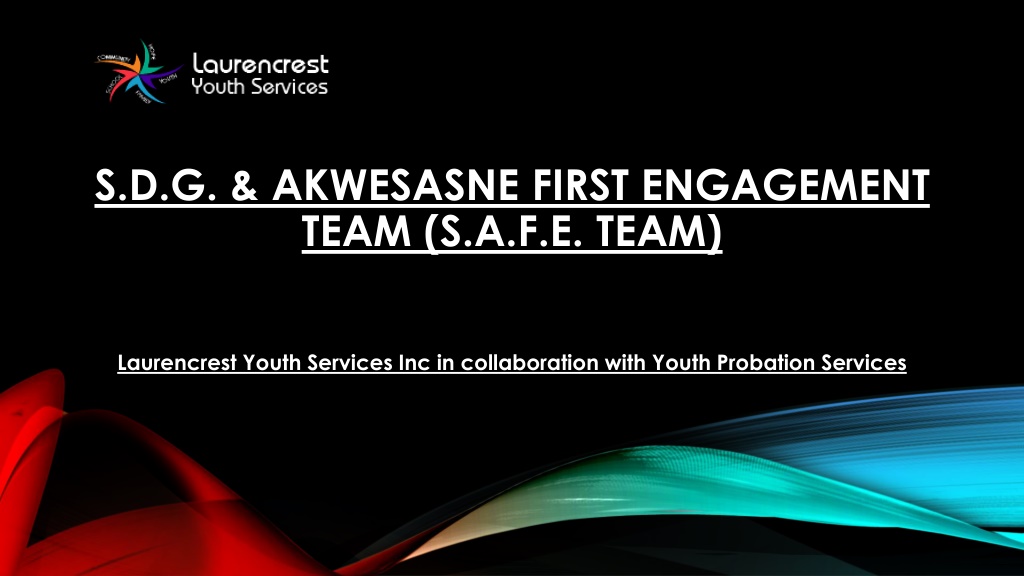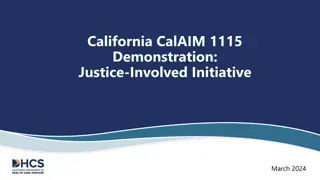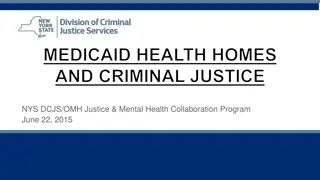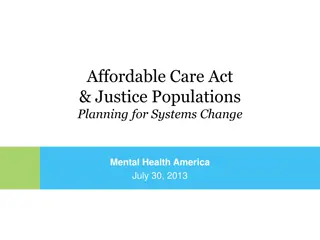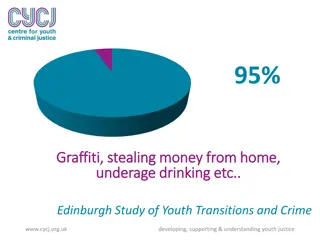Supporting Justice-Involved Youth: S.A.F.E. Team Initiative for Mental Health and Basic Needs
Collaborated by Laurencrest Youth Services Inc. and Youth Probation Services, the S.A.F.E. Team aims to enhance identification and intervention services for justice-involved youth with mental health, addiction, and basic needs issues in the Youth Court. By reducing recidivism, increasing family support, and providing streamlined services aligned with YCJA principles, the program addresses the significant mental health challenges faced by youth in the justice system. Early intervention can help prevent negative outcomes and break the cycle of recidivism.
Download Presentation

Please find below an Image/Link to download the presentation.
The content on the website is provided AS IS for your information and personal use only. It may not be sold, licensed, or shared on other websites without obtaining consent from the author. Download presentation by click this link. If you encounter any issues during the download, it is possible that the publisher has removed the file from their server.
E N D
Presentation Transcript
S.D.G. & AKWESASNE FIRST ENGAGEMENT TEAM (S.A.F.E. TEAM) Laurencrest Youth Services Inc in collaboration with Youth Probation Services
Vision: For the Youth Court to act as a platform to support justice involved youth with mental health, addiction, and/or basic needs issues.
S.A.F.E. Team Goals: The intent of the S.A.F.E. Team is outlined in the following five pillars: 1. Improved identification of mental health, addiction, and basic needs for all youth who appear before the Youth Court; 2. To provide a full spectrum of intervention services to Justice involved youth at the first available opportunity in Youth Court; 3. Improved understanding of the needs of the Youth Court system; 4. Improved collaboration across community based services within SDG & Akwesasne; 5. Increased referrals to the Youth Court Mental Health Worker program and other community agencies.
Collective Impact and the Benefit to the Youth Court: Decrease recidivism; Increase family support, access to services at an earlier phase in the process; Provide streamlined services; Program is aligned with the principles of the YCJA; Improved functioning of clients both socially and behaviourally; Increase client skills abilities.
Background: Between 65-70% of youth involved in the justice system have one or more mental health challenge which may include addiction issues, developmental disorders, intellectual disabilities, acquired brain injuries, or fetal alcohol spectrum disorder. (Shufelt, J.S & Cocozza, J.C. (2006). Youth with mental health disorders in juvenile justice systems: Results from a multistate, multi-system prevalence study. Delmar, NY: National Centre for Mental health and Juvenile Justice) In addition, should mental health challenges not be recognized and properly addressed, it has been demonstrated that such is frequently associated with school difficulties, unemployment, poverty, incarceration, ongoing police contact, and a cycle of recidivism. Evidence shows that early intervention addressing mental health and addiction needs can prevent some of these negative outcomes and consequently reduce the rate of youth recidivism. (United States. President sNew Freedom Commission on Mental Health. (2003). Achieving the promise: transforming mental health care in America: Final report. [Rockport, Md.]: President s New Freedom Commission on Mental Health)
A number of communities throughout the province, with the oversight from the Provincial System Support Program (PSSP) and the Centre for Addiction and Mental Health (CAMH) have developed and implemented screening programs at their respective Youth Courts to screen youth at an early point in their Court process for mental health, addiction, and basic needs issues. Should areas of need be identified the youth is provided with referral(s) to community based agencies for support. With the consent of the youth, family members are invited to be part of this process.3
Statistics relating to SDG & Akwesasne Youth Population and the Population of Justice Involved Youth SDG and Akwesasne Population: Youth aged- 10-14 = 5,890 Youth aged- 15-19= 6,185 Total 12,075 SDG and Akwesasne Justice Involved Youth: Extra Judicial Sanctions (EJS): 2017 (to date) = 30 2017 (outstanding = 11 2016 =27
Youth Court Mental Health Worker Program: 2016-2017: April 01, 2016- March 31, 2017 Referrals = 55 (43: Males 12: Females) CAS involvement = 21 Diverted = 13 2017-2018: April 01, 2017- October 31, 2017 Referrals = 37 (30: Males 7: Females) CAS involvement = 13 Diverted = 5
Cornwall Court: vs. Provincial Average: Percentage of Disposed Cases by Months to Disposition Oct. 2016-Sept. 20175 TIME FRAME CORNWALL PROVINCE CORNWALL % DIFF vs. PROVINCE 0-3 months 45% 50% -5% 3-10 months 34% 35% -1% 10-15 months 11% 9% +3% 15-18 months 4% 3% +1% Over 18 months 7% 3% +4%
Though Cornwall is slightly ahead of the overall provincial average for processing matters through to disposition, these statistics demonstrate that, for the Cornwall Court, 45% of youth wait up to 90 days before their matter is resolved while another 45% wait between 90 and 450 days until their matter is resolved. These statistics are outlined as a means of suggesting there may be a benefit to youth who are connected with services prior to their matter being resolved in Court.
S.A.F.E. Program: A S.A.F.E. Steering Committee will be established to support the development and implementation of a S.A.F.E. team. Once the Steering Committee team is established, along with S.A.F.E. Team policy and procedures, community partners will be educated in this initiative via a townhall style meeting. Members from various community social services agencies will be invited to sit as advisory board members.
First Appearance youth meet with Duty Counsel. Crown requests remand for all first appearance youth to provide opportunity to meet with the Screening Team. If no further legal consultation is required, youth are directed to the S.A.F.E. Team. Greeter from S.A.F.E. Team engages youth and family. Introduces them to the designated screening team member. A S.A.F.E. Team member screens youth for Mental Health, Addiction, and other basic needs. (e.g. FNMI or French language screening options are presented to youth and family. Screening completed by screening team member at youth court (consent, supplementary screening form, and MAYSI-2) (Basic needs identified) Screening Team Rally Mental Health or Addiction concerns identified. Youth Declines Screening/Services) No Mental Health or Addiction Concerns: No referral requested or needed. No MH/A issues but basic need referrals suggested. recommended/requested (Basic Community Referrals/requested or needed. EJS youth- Intake to EJS Program / MH Diversion (Laurencrest) FNMI youth: Intake to Aboriginal court support worker YMHCW youth: Intake to YMHCW program (Laurencrest)
Next Steps: Establish SAFE Team Steering Committee members and partnerships. Meet with members of Akwesasne Department of Justice on January 12, 2018 to establish a partnership. Meet with Crown and Duty Counsel Office to establish logistics with regards to implementation. Establish detailed S.A.F.E. Team policy and procedures.
Explore Funding resources within the community. A townhall style meeting with community partners will be established to educate the community on the initiative. A screening team and screening rotation will also be established from members of agencies who have partnered with us. It is planned that by March of 2018 the S.A.F.E. program can be implemented.
